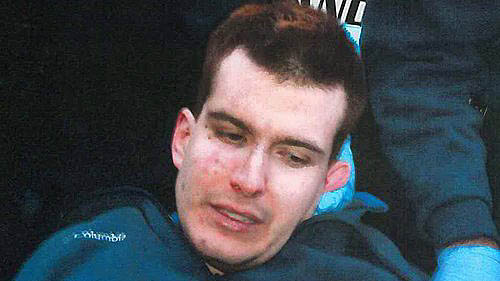The Maloneys
The Maloneys of McCandless have four children. The two middle boys have severe autism. One of the middle boys also has Down syndrome. Neither of the boys, ages 20 and 18, is toilet trained. Story
Has autism become an epidemic, or is the increase in autism diagnoses due to new criteria and more awareness of the condition?
Causes and treatment
So far, no single theory explains why autism occurs.
The sooner autistic children are diagnosed and treated, the better they do. Some children even see their autistic symptoms disappear.

Penn State researcher finds DNA duplications in people with autism.
Autism appears to be linked with abnormalities in the "daydreaming" brain network.
Epigenetics
Researchers are exploring whether exposures or stresses to a fetus in the womb can cause problems a generation later.
The Eschers: Neither Jill Escher nor her husband have any genetic markers for autism. But their two children have the disorder. Ms. Escher wonders whether medicines that her own mother took predisposed Ms. Escher to have autistic children.
The Galuccis: The Galuccis have four young boys. The middle two are on the autism spectrum, and the youngest boy may end up there, too.
Adulthood
Marshall University in Huntington, W.Va., has the oldest program in the nation for training higher functioning autistic people to help them get college degrees and jobs.
Shawn Eack of the University of Pittsburgh runs cognitive training sessions for adults with autism that attempt to teach them how to think more practically and interact socially in more normal ways.
A study by CMU's Marlene Behrmann found that people with autism did a better job than others in scanning TSA baggage X-rays for weapons.
About this series
Every day, we are reminded of a mental disorder that affects our society.
Yet another mass shooting rips lives apart, and often the gunman has a history of mental illness. News reports document another athlete whose life has crumbled after repeated blows to the head.
A new statistical study raises the odds of a child being born with autism, or television commercials show depressed people barely able to get out of bed. And each month, there seems to be a new type of phobia to report.
They all have one thing in common: deep-rooted defects in the function of the brain that scientists are just beginning to understand.
Over the next year, the Pittsburgh Post-Gazette will explore five of these brain disorders:
- Schizophrenia
- Chronic traumatic encephalopathy, a form of brain deterioration affecting athletes and soldiers
- Autism
- Depression
- Phobias
Credits:
- Mark Roth, stories
- Julia Rendleman, videos and photos
- Michael Henninger, videos and photos
- Bob Donaldson, photos
- Laura Malt Schneiderman, online site
Jonah
Schizophrenia involves hallucinations, delusions and cognitive deterioration. It can mean a lifetime of dependency for patients -- and in rare cases, it leads to frightening outbursts of violence.
Jonah can remember the day the "switch got flipped" in his brain. Story
Research
The schizophrenic brain is hobbled by three problems -- delusions, hallucinations and thinking difficulties. Many researchers believe the most important symptom to tackle is the last of these. Story
Two of the best known "public" schizophrenia patients in America discuss the stigma of their condition. Story
Some scientists believe infections may play a part in triggering schizophrenia. Story
Schizophrenia patients might be more logical than the rest of us. Story

Rare violence
The vast majority of people with mental illness are not violent. But it does seem that a disproportionate number of mass shootings involve people with mental illness. Story

Athletes and CTE
CTE, or chronic traumatic encephalopathy, is a brain disorder caused by repeated head trauma.
Fred McNeil, who played professional football and later became a lawyer, lost his law license and driver's license because of dementia and now needs live-in caretakers. Story
Science
The first pathologist to diagnose CTE in a former football player talks about what he saw in the brain of former Steelers center Mike Webster. Story

Mike Webster
Former Steeler Mike Webster used to have a slow fuse off the football field. But gradually he became a moody, explosive man who tore through all his family's money and would lock himself in the bathroom for hours at a time. Story
Lawsuit
The brain degeneration known as CTE is at the heart of civil suits by more than 5,000 former players and surviving family members against the National Football League. The parties reached a tentative out-of-court settlement worth $765 million in August 2013. Story

Treatments
Many people think electroshock therapy has gone the way of frontal lobotomies, but in fact the modern, less damaging version of electroconvulsive therapy is still widely used.
Also, scientists are developing an experimental brain surgery known as DBS, or deep brain stimulation.
UCLA's Ian Cook is experimenting with a new treatment using electrodes attached to the forehead.
Facts about chronic depression
Effectiveness
Bettie Davis wasn't diagnosed with depression until she was in her 50s. But she probably had experienced it for most of her life. Story
Three academics bring differing viewpoints to the issue of how effective antidepressant medications are.
Interactive: Comparing five top-selling antidepressant medications
Another experimental depression treatment is in development, using an anesthetic called ketamine.

Prevention
Pitt’s Charles Reynolds is exploring how to prevent depression in people who are vulnerable to it.
At the University of Pittsburgh, the largest recipient of federal psychiatric research funds in the nation, and other universities around the nation, scientists talk about their latest work.
Placebo effect
Teenagers and young adults suffer from depression, too. In fact, many people with chronic depression were hit with the illness after puberty.
Columbia University’s Bret Rutherford studies the placebo effect.
Social anxiety disorder may be the most devastating phobia that exists. Those who have it often can’t get or keep the jobs they want because of crippling fear of interacting with others, and they struggle with forming intimate relationships.
At New York University, pioneering researcher Joseph LeDoux has discovered a potential method for permanently expunging intense fears.
Researchers are beginning to believe psychiatric disorders are triggered by genes.
What are the most prevalent phobias in the world? Check our chart.